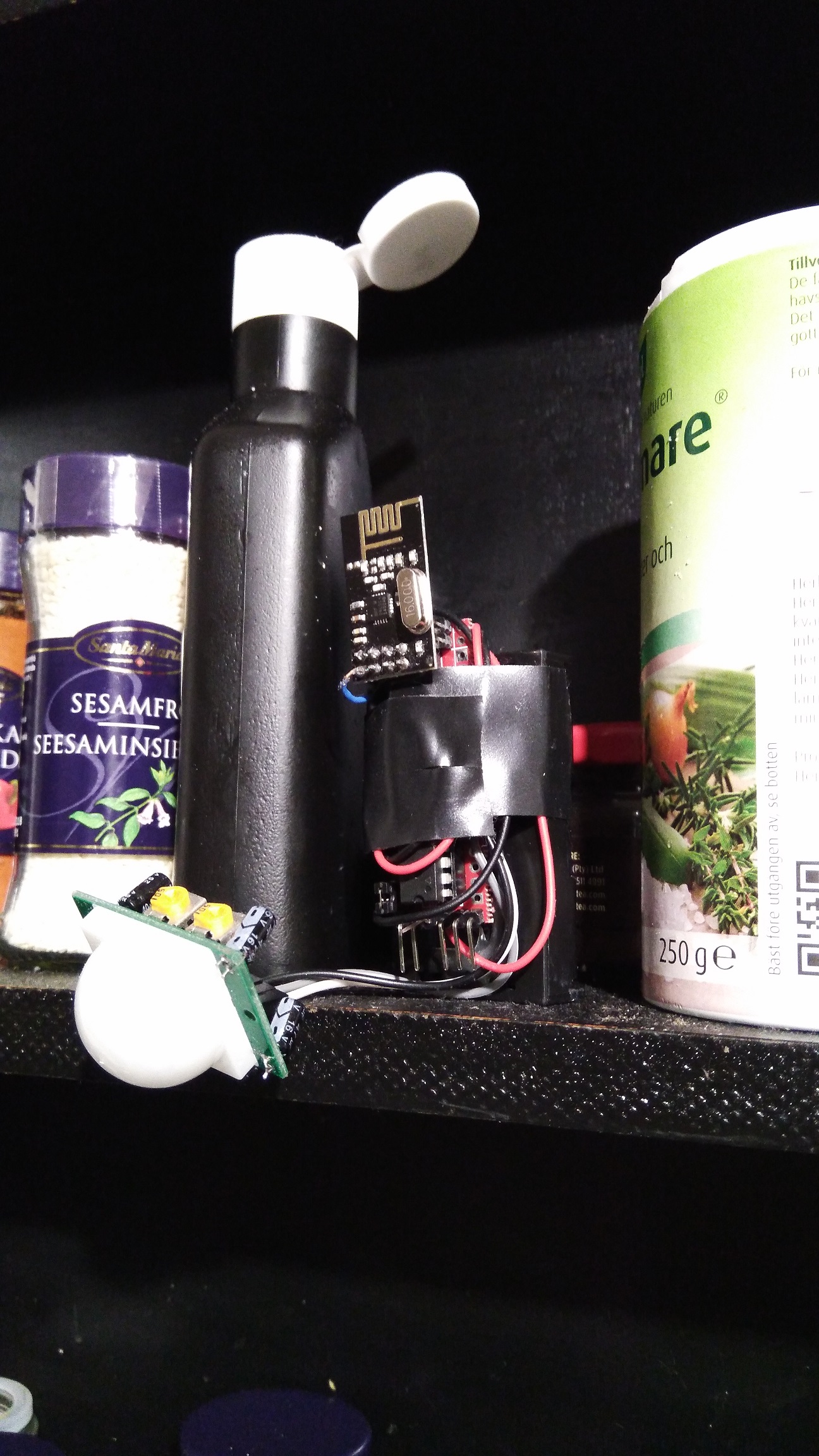What did you build today (Pictures) ?
-
So for a few days now I have been working on my idea for a homebrew CNC machine made from mostly salvaged parts. This weekend I made some good progress getting the Y axis drive assembly mostly done. I have not tested anything yet, but I hope to in the next few days. Anyways, here is what I have...
The stepper motor is one salvaged from an old dot matrix printer. The gear on it was press fit on the shaft with no real way to get it off, so I opted to make a geared drive assembly. I realize that this will slow the Y axis down, but it should also give it a bit more precision. Below is the stepper motor.
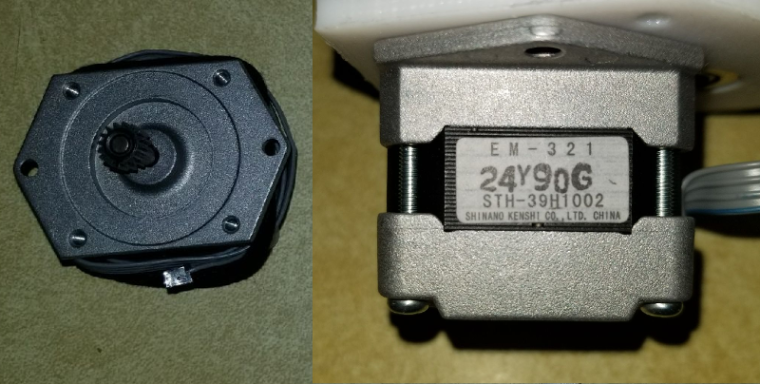
For mounting it, I designed this adapter plate which carries a steel roller bearing for the screw shaft.
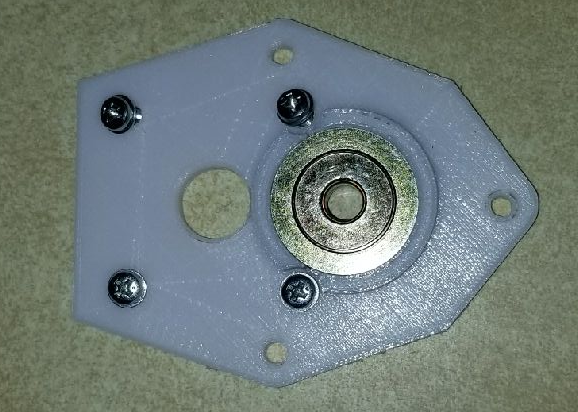
This is an early mounting plate design before I added the upper and lower mounting tabs. This shows the gear with the shaft attached. The gear was made using an OpenSCAD gear library.
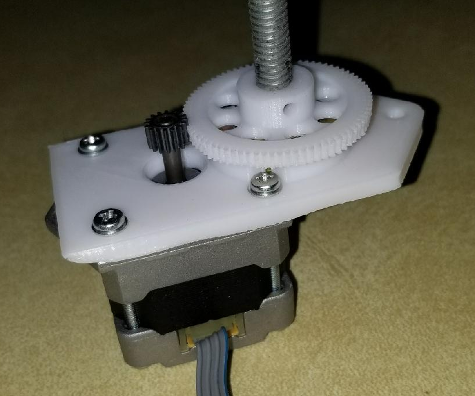
Yesterday I designed the bracket that attaches to and drives the Y axis platter/build plate (Sorry, forgot to take a decent pic of that part).
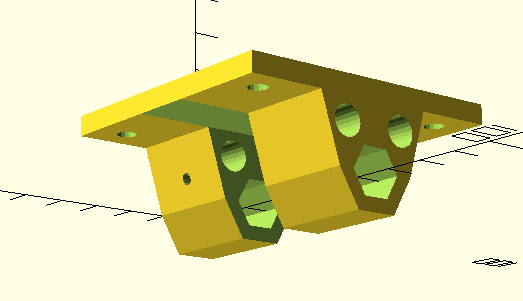
Today I was able to finish the front and rear frame braces and got parts rough fitted together. the 2 rails with the small white linear bearings are some rods that were salvaged from a couple old scanners. These were used as the rail for the scanner head. I have pics of the full assembly as well as the motor assembly mounted on the rear brace.
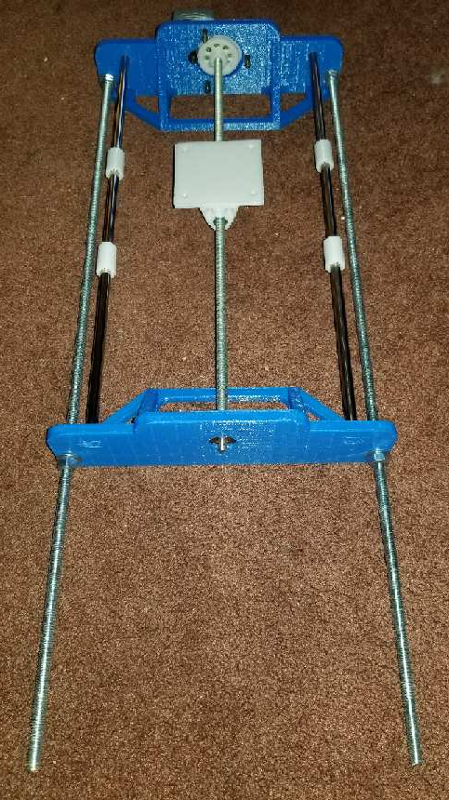
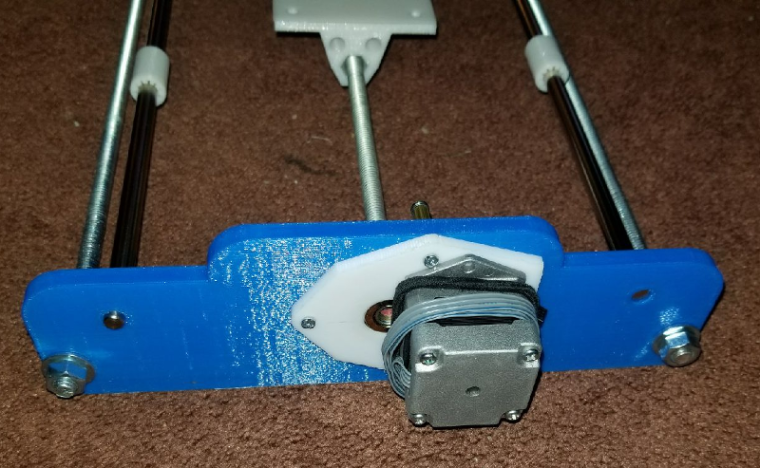
I can't say how well the design will work, if at all, but it has been a fun journey so far trying.
-
So for a few days now I have been working on my idea for a homebrew CNC machine made from mostly salvaged parts. This weekend I made some good progress getting the Y axis drive assembly mostly done. I have not tested anything yet, but I hope to in the next few days. Anyways, here is what I have...
The stepper motor is one salvaged from an old dot matrix printer. The gear on it was press fit on the shaft with no real way to get it off, so I opted to make a geared drive assembly. I realize that this will slow the Y axis down, but it should also give it a bit more precision. Below is the stepper motor.

For mounting it, I designed this adapter plate which carries a steel roller bearing for the screw shaft.

This is an early mounting plate design before I added the upper and lower mounting tabs. This shows the gear with the shaft attached. The gear was made using an OpenSCAD gear library.

Yesterday I designed the bracket that attaches to and drives the Y axis platter/build plate (Sorry, forgot to take a decent pic of that part).

Today I was able to finish the front and rear frame braces and got parts rough fitted together. the 2 rails with the small white linear bearings are some rods that were salvaged from a couple old scanners. These were used as the rail for the scanner head. I have pics of the full assembly as well as the motor assembly mounted on the rear brace.


I can't say how well the design will work, if at all, but it has been a fun journey so far trying.
@dbemowsk
Well it looks as if your 3D-printer works fine :grinning:What I would be slightly worried about is if with the given size of the rods the stiffness of the structure would be enough.
Hope to see more from this project in the near future.
Good luck! -
@dbemowsk
Well it looks as if your 3D-printer works fine :grinning:What I would be slightly worried about is if with the given size of the rods the stiffness of the structure would be enough.
Hope to see more from this project in the near future.
Good luck!@boozz I will be curious to see if I can get enough precision to do PCBs. I have yet to buy a GRBL board to control it. For now I am going to use the UNO that I have for testing just to do test runs of the servos until I get one. This is the one I have been looking at:
https://www.ebay.com/itm/Arduino-CNC-Shield-Kit-UNO-Board-4x-DRV8825-Drivers-Package-Deal-FREE-USA-SHIP/292174947187?hash=item4406fbe373:g:A0sAAOSwJThZpeKr
I will also have to figure out the gear ratios of the motor assemblies once I am done because I am sure I will need them to calibrate the GRBL setup. I know on this part of it I have about a 4.8:1 ratio from the motor to the large gear, but I'll have to figure out steps per cm or steps per mm or something. If anyone knows a good way of figuring this out I am all ears.Thanks for the upvotes.
-
@boozz I will be curious to see if I can get enough precision to do PCBs. I have yet to buy a GRBL board to control it. For now I am going to use the UNO that I have for testing just to do test runs of the servos until I get one. This is the one I have been looking at:
https://www.ebay.com/itm/Arduino-CNC-Shield-Kit-UNO-Board-4x-DRV8825-Drivers-Package-Deal-FREE-USA-SHIP/292174947187?hash=item4406fbe373:g:A0sAAOSwJThZpeKr
I will also have to figure out the gear ratios of the motor assemblies once I am done because I am sure I will need them to calibrate the GRBL setup. I know on this part of it I have about a 4.8:1 ratio from the motor to the large gear, but I'll have to figure out steps per cm or steps per mm or something. If anyone knows a good way of figuring this out I am all ears.Thanks for the upvotes.
-
@boozz I will be curious to see if I can get enough precision to do PCBs. I have yet to buy a GRBL board to control it. For now I am going to use the UNO that I have for testing just to do test runs of the servos until I get one. This is the one I have been looking at:
https://www.ebay.com/itm/Arduino-CNC-Shield-Kit-UNO-Board-4x-DRV8825-Drivers-Package-Deal-FREE-USA-SHIP/292174947187?hash=item4406fbe373:g:A0sAAOSwJThZpeKr
I will also have to figure out the gear ratios of the motor assemblies once I am done because I am sure I will need them to calibrate the GRBL setup. I know on this part of it I have about a 4.8:1 ratio from the motor to the large gear, but I'll have to figure out steps per cm or steps per mm or something. If anyone knows a good way of figuring this out I am all ears.Thanks for the upvotes.
@dbemowsk said in What did you build today (Pictures) ?:
If anyone knows a good way of figuring this out I am all ears.
It would expect making a large movement using a defined number of steps, and measuring the actual distance moved with a caliper will give you a rather accurate steps/mm.
However, I hope this ratio is constant over the whole range, given the 3d printed gears and expected backlash... -
@dbemowsk said in What did you build today (Pictures) ?:
If anyone knows a good way of figuring this out I am all ears.
It would expect making a large movement using a defined number of steps, and measuring the actual distance moved with a caliper will give you a rather accurate steps/mm.
However, I hope this ratio is constant over the whole range, given the 3d printed gears and expected backlash... -
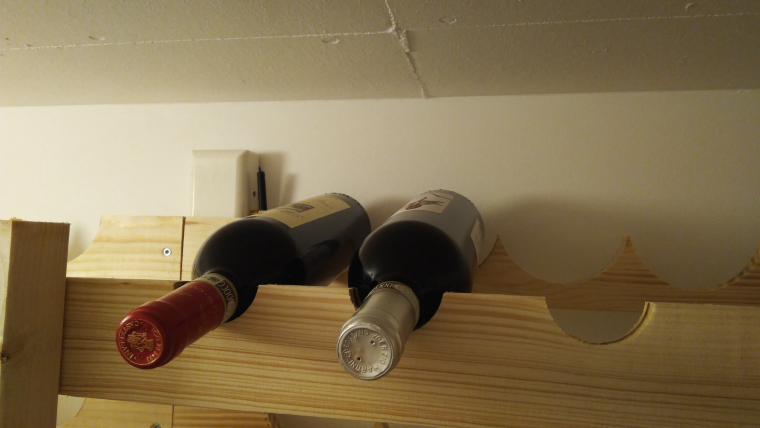
I'm building a wine rack for my wife in a celler room (currently 14 dgr with 4 dgr outside). I mowed my beer cooler temp node (rfm radio) to measure how much the temp changed over the day. I wrote a script in Lua/Domoticz that each time it changes 1dgr it should notify me. Apparently is a stable temp the most important to store wine.
All ideas how I can automate the shit out of this wine-room are appreciated.
-
LCD display with temp/hum (both on the floor and celling) (Red needs apparently cooler than white wine... Or the opposite).
-
I'm thinking about to try a passive cooler. A burried hose/pipe in a loop with a 12v fan/pump and temp. My idea is that if I rotate the 14dgr air in a say 20m pipe under ground it should cool the air some . This needs to be automated to keep the temp stable.
-
light. Some sort of led strips.
@sundberg84
Redundancy, maybe you should get a second temp/humidity measurement device, just in case your current beer cooler temp node breaks down... -
-
@sundberg84
Redundancy, maybe you should get a second temp/humidity measurement device, just in case your current beer cooler temp node breaks down... -
@mfalkvidd
True but usually wines have a higher price and a more valuable - not starting a discussing/flame war what is best to drink... -
@mfalkvidd Can't have too much redundancy there...
-
Made this 12 button keypad. Requires only one analog pin to read which button is pressed, and any button press can also wake an arduino from sleep:
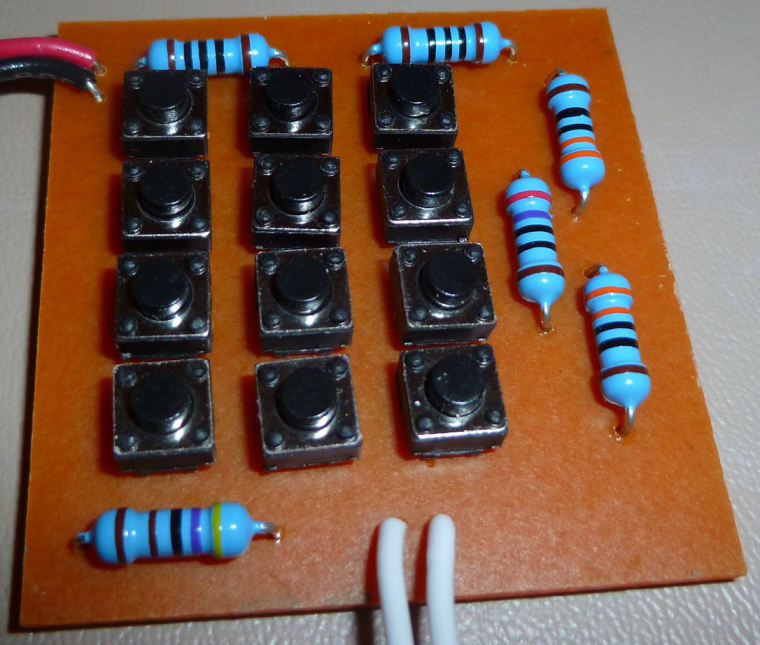
Consumes no power when no button is pressed. -
Made this 12 button keypad. Requires only one analog pin to read which button is pressed, and any button press can also wake an arduino from sleep:

Consumes no power when no button is pressed.Here's a thread which covers it in more detail: https://forum.mysensors.org/topic/8936/6-8-buttons-battery-remote-node/36
-
Here's a thread which covers it in more detail: https://forum.mysensors.org/topic/8936/6-8-buttons-battery-remote-node/36
@neverdie what happens when you press two or more buttons ??
-
@neverdie what happens when you press two or more buttons ??
@rozpruwacz Well, with the sketch I wrote (see link), you'd get the value of the first button pressed, and that's it. You'd have to release all the buttons before selecting a new button.
In terms of the hardware itself, there's an order of precedence to the buttons, so at all times you'd only be able to read the value of a single button, even if more than one button were pressed. In a multi-button press scenario, the buttons of lower precedence are ignored.
It's a good question though. If you needed to read more than one button simultaneously (such as, for example, move an RC car forward and turn right at the same time), this wouldn't do it. Seems like such a circuit would be possible though, maybe even one based on simple voltage dividing like this one. Somehow you'd need to sum unique resistances for each button pushed instead of just choose a single resistance. I can imagine doing that for a few buttons on an arduino, but maybe not as many as 12.
-
@rozpruwacz Well, with the sketch I wrote (see link), you'd get the value of the first button pressed, and that's it. You'd have to release all the buttons before selecting a new button.
In terms of the hardware itself, there's an order of precedence to the buttons, so at all times you'd only be able to read the value of a single button, even if more than one button were pressed. In a multi-button press scenario, the buttons of lower precedence are ignored.
It's a good question though. If you needed to read more than one button simultaneously (such as, for example, move an RC car forward and turn right at the same time), this wouldn't do it. Seems like such a circuit would be possible though, maybe even one based on simple voltage dividing like this one. Somehow you'd need to sum unique resistances for each button pushed instead of just choose a single resistance. I can imagine doing that for a few buttons on an arduino, but maybe not as many as 12.
@neverdie I'm asking because I Was trying to do something like this. If there was a resistor values set that would make all 2**n (where n is the number of buttons) choices spaced enough in voltage domain it would work, but I couldn't find such a set ...
-
@neverdie I'm asking because I Was trying to do something like this. If there was a resistor values set that would make all 2**n (where n is the number of buttons) choices spaced enough in voltage domain it would work, but I couldn't find such a set ...
@rozpruwacz said in What did you build today (Pictures) ?:
@neverdie I'm asking because I Was trying to do something like this. If there was a resistor values set that would make all 2**n (where n is the number of buttons) choices spaced enough in voltage domain it would work, but I couldn't find such a set ...
That's why it might work if you needed it for only a few buttons. With only 1024 units of voltage, seems like you'd quickly run out of resolution if you tried to do more.
-
I built my first MysX daughter board which I will connect to my EasyPCB to drive a led strip.
This will power everything from 12v so 2 things. Power main board and dim LED strip.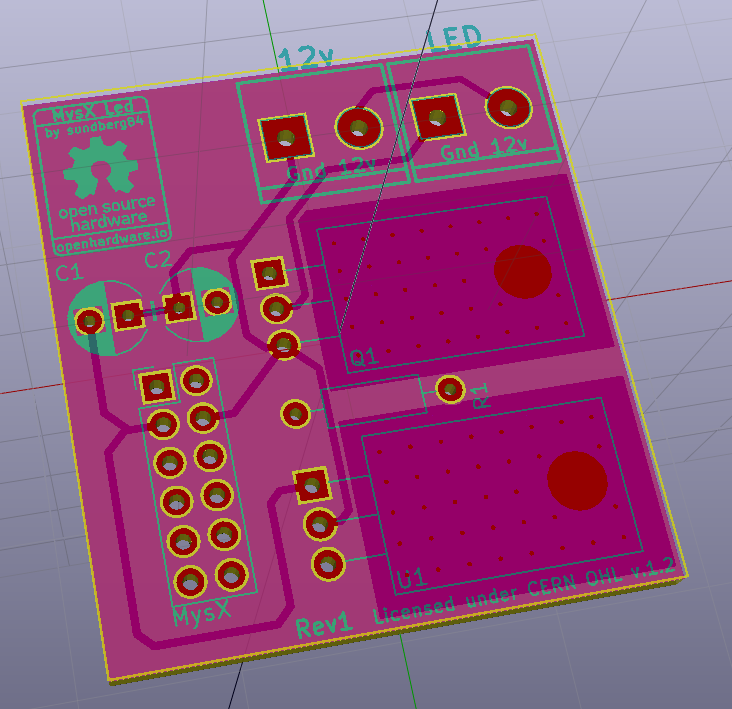
-
I built my first MysX daughter board which I will connect to my EasyPCB to drive a led strip.
This will power everything from 12v so 2 things. Power main board and dim LED strip.
Do anyone knows it the back of a TO-220 always is connected to GND and if this should be connected to the board GND as well? Currently I have a exposed copper as a heatsink but this copper is not connected to GND.
-
Depends on the manufacturer / device type.. So look in the datasheet of the one that you want to use.
@tbowmo
Thank you - I want to be able to use them all/different (ie. 5v, 3.3v, different manufacturer) so I wont connect it and just use it as a heatsink.

